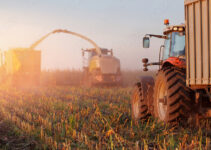In today’s rapidly changing agricultural world, maximizing farm efficiency is crucial. Farmers constantly seek innovative methods to boost productivity, cut down on labor, and increase yields. Advanced agricultural equipment and technologies have emerged as key solutions, enabling you to optimize various aspects of your farming operations.
From precision agriculture to automated machinery, these advancements streamline tasks and provide valuable data for making informed decisions. Exploring the latest trends in agricultural technology will reveal how these tools can transform your farm business, making it more efficient and sustainable than ever before.
Automated Machinery: Boosting Productivity And Reducing Labor
Automated machinery has revolutionized agriculture by significantly cutting down on manual labor. Tractors, harvesters, and planters equipped with advanced technology perform tasks with minimal human intervention, increasing efficiency and allowing you to focus on other critical aspects of farm management.
Modern tractors with GPS-guided steering systems ensure precise field navigation, reducing overlap and minimizing fuel consumption. Automated harvesters detect and collect crops at the perfect ripeness, ensuring maximum yield and quality. Equipment like pilers and conveyors, such as those from milestone-equipment.com, are designed to be gentle on crops like potatoes and easy to operate, further enhancing efficiency.
Automated machinery is also continuously evolving, with new models offering even greater capabilities. Investing in the latest equipment ensures your farm remains at the cutting edge of agricultural technology, boosting efficiency and productivity.
Precision Agriculture: Transforming Crop Management
Precision agriculture is a modern approach that uses technology for precise crop management. By utilizing GPS and GIS systems, you can monitor soil conditions, weather patterns, and crop health in real-time. This data-driven strategy ensures optimal planting, fertilizing, and harvesting times, enhancing farm efficiency.
Various tools in precision farming, such as soil sensors, weather stations, and drones, gather detailed information about your fields, allowing you to make precise adjustments that improve crop yield and quality. Precision agriculture reduces waste, lowers production costs, and boosts productivity.
Integrating precision agriculture into your routine not only improves crop management but also promotes sustainability. Efficient use of resources like water and fertilizers contributes to environmental conservation while maximizing farm income potential.
Irrigation Systems: Efficient Water Usage
Effective irrigation is vital for maintaining healthy crops and maximizing farm efficiency. Advanced irrigation systems, like drip and sprinkler systems, deliver water directly to the plant roots, reducing wastage and promoting optimal growth. These systems can be controlled remotely, providing the flexibility to manage water usage precisely.
Soil moisture sensors integrated with irrigation systems offer real-time data, allowing you to adjust water levels based on the specific needs of your crops. This targeted approach conserves water and ensures plants receive the right amount of moisture for optimal growth.
Implementing advanced irrigation systems improves crop yield and quality while conserving valuable water resources, enhancing farm efficiency, and supporting sustainable farming practices.
Drones: Aerial Crop Monitoring And Surveillance
Drones have become invaluable in modern agriculture, providing a bird’s-eye view of your fields. Equipped with high-resolution cameras and sensors, drones capture detailed images and data, allowing you to monitor crop health, identify pests, and assess soil quality conditions. This aerial surveillance offers a comprehensive understanding of your farm’s status.
Using drones for crop monitoring enables early detection of issues, allowing you to take corrective actions promptly. For instance, if a section of your field shows signs of disease or pest infestation, you can address the problem before it spreads, minimizing damage and loss. This proactive approach significantly enhances farm efficiency.
Additionally, drones can be used for precision spraying of pesticides and fertilizers, targeting specific areas, reducing chemical usage, and lowering production costs while ensuring your crops receive the necessary treatments for optimal growth.
Smart Sensors: Real-Time Field Monitoring

Smart sensors are revolutionizing agriculture by providing real-time monitoring of environmental factors. These sensors measure soil moisture, temperature, humidity, and nutrient levels, giving you a comprehensive understanding of field conditions. This real-time data allows for immediate adjustments, ensuring optimal growing conditions for your crops.
For instance, soil moisture sensors can automatically trigger irrigation systems when moisture levels drop below a certain threshold, ensuring your plants receive consistent and adequate water supply. Similarly, nutrient sensors help apply fertilizers precisely, avoiding overuse and reducing costs.
Integrating smart sensors into your farming operations achieves greater control and accuracy, improving crop performance and resource utilization. This technology enhances efficiency and supports sustainable farming practices.
Robotics: Automating Labor-Intensive Tasks
Robotics is rapidly advancing in agriculture, offering solutions for labor-intensive tasks like planting, weeding, and harvesting. Agricultural robots, or agrobots, perform these tasks with high precision and efficiency, reducing the reliance on manual labor and increasing productivity.
Planting robots place seeds at the optimal depth and spacing, ensuring uniform crop growth. Weeding robots use advanced sensors and AI to identify and remove weeds without harming crops, reducing the need for herbicides. Harvesting robots pick fruits and vegetables with care, minimizing damage and maximizing yield.
Adopting robotics in agriculture improves efficiency and addresses labor shortages. Automating repetitive tasks allows your workforce to focus on more complex and value-adding activities, further enhancing farm business operations.
Vertical Farming: Maximizing Space And Yield
Vertical farming is an innovative approach that involves growing crops in vertically stacked layers, often in controlled indoor environments. This method maximizes space utilization and allows year-round production, regardless of external weather conditions. Optimizing growing conditions through vertical farming can achieve higher yields and improve farm efficiency.
In vertical farming systems, crops are grown using hydroponics or aeroponics, requiring minimal soil and water. LED lighting and climate control systems ensure optimal growth conditions, resulting in faster crop cycles and higher productivity. This approach is particularly beneficial in urban areas with limited agricultural land.
Vertical farming also reduces transportation needs, as crops can be grown closer to urban markets. This lowers carbon emissions and ensures fresher produce for consumers. Embracing vertical farming enhances efficiency and sustainability in food production.
Biotechnology: Enhancing Crop Resilience And Yield
Biotechnology plays a crucial role in advancing agricultural practices by developing crops with enhanced traits. Through genetic modification and gene editing, scientists create crops that are more resistant to pests, diseases, and environmental stresses. These innovations significantly contribute to farm efficiency by reducing the need for chemical inputs and improving crop resilience.
For example, genetically modified crops can withstand drought conditions, ensuring consistent yields even in challenging climates. Pest-resistant crops reduce the need for pesticides, lowering costs and environmental impact. These biotechnological advancements enable higher productivity and sustainability.
In addition to genetic modifications, biotechnology also includes developing bio-based fertilizers and pesticides. These products, derived from natural sources, offer an eco-friendly alternative to traditional chemicals, supporting sustainable farming practices.
Renewable Energy: Sustainable Power Solutions
Renewable energy sources, such as solar and wind power, are becoming increasingly important in agriculture. By harnessing these renewable energy sources, you can reduce reliance on fossil fuels and lower operational costs. Solar panels installed on your farm generate electricity to power irrigation systems, machinery, and other essential operations.
Wind turbines provide a sustainable energy source, especially in regions with consistent wind patterns. Integrating renewable energy solutions contributes to environmental conservation and enhances the sustainability of your farming practices.
Using renewable energy can also lead to significant cost savings over time. By reducing energy expenses, you can allocate resources to other critical areas of your farm business, ultimately improving production efficiency and profitability.
Sustainable Practices: Balancing Productivity And Conservation
Sustainable farming practices are essential for balancing productivity with environmental conservation. Techniques such as crop rotation, cover cropping, and conservation tillage maintain soil quality, reduce soil erosion, and promote biodiversity. These practices contribute to long-term farm efficiency by preserving the natural resources vital for crop production.
Crop rotation involves alternating different crops in the same field to improve soil fertility and reduce pest and disease pressure. Cover cropping entails planting specific crops to cover the soil during off-seasons, preventing erosion and enhancing soil structure. Conservation tillage minimizes soil disturbance, preserving soil organic matter and moisture.
Adopting sustainable agriculture practices ensures the longevity and productivity of your farm. These techniques enhance production efficiency and support a healthy ecosystem, benefiting both your farm and the environment.
Artificial Intelligence: Enhancing Predictive Analytics And Automation
Artificial intelligence (AI) is transforming agriculture by providing predictive analytics and automation capabilities. AI algorithms analyze vast amounts of data to identify patterns and make predictions, helping you optimize planting schedules, manage pests, and improve crop performance. This data-driven approach enhances farm income and efficiency by enabling proactive decision-making.
For instance, AI-powered tools can predict weather patterns and suggest the best times for planting and harvesting. These tools also identify early signs of pest infestations or diseases, allowing you to take preventive measures before significant damage occurs. Leveraging AI helps make informed decisions that boost productivity and reduce risks.
AI also automates various farming tasks. Autonomous tractors, drones, and robots equipped with AI perform tasks like planting, spraying, and harvesting with high precision and efficiency. This automation reduces the need for manual labor and enhances overall farm operations.
Wrap-Up
Maximizing farm efficiency is essential for staying competitive and sustainable in today’s agricultural landscape. By embracing advanced agricultural equipment and technologies, you can optimize every aspect of your farming operations. From precision farming and automated machinery to renewable energy and artificial intelligence, these innovations offer solutions that enhance productivity, reduce costs, and support sustainable practices. Continuously exploring and adopting new technologies ensures your farm remains at the forefront of agricultural advancements, driving success and sustainability for years to come.
